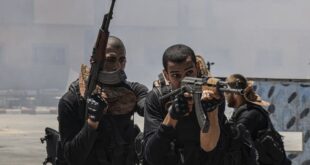Palestinian intelligence chief seriously wounded in blast as Abbas announces dialogue with HamasÂ
Agencies
Â
AN ISRAELI AIR strike in Gaza killed four Palestinians, including a top Islamic Jihad fighter, on Saturday, prompting calls of revenge by the armed group to continue targeting Israel in rocket attacks.
The missile strike occurred hours after Palestinian general intelligence chief Tareq Abu Rajab was brought to Israel to treat wounds sustained in an explosion in an elevator at his Gaza Strip headquarters.
His ally President Mahmoud Abbas called the blast, which killed one of Abu Rajab’s aides and wounded 10 people, an assassination bid.
If confirmed as a targeted attack, it would mark the highest-profile internal assassination attempt in the West Bank and Gaza Strip and could worsen enflamed tensions between loyalists of Abbas’ Fateh group and Hamas supporters.
The Hamas-led government, formed after the Islamic group beat Fateh in a January parliamentary election and which is shunned by Washington and other world powers because of its vow to destroy Israel, said an investigation would be launched.
Saturday’s missile strike, which medics said also killed a boy and his mother and grandmother, was the latest such attack since April, when an Israeli air strike killed an Islamic Jihad activist after a deadly suicide bombing by the group in Israel.
Mohammad Dahdouh, was a senior Islamic Jihad commander responsible for recent firings of advanced Russian-made rockets into Israel, a spokesman for the group and the Israeli army said. Islamic Jihad has masterminded dozens of anti-Israeli attacks since a Palestinian uprising began in 2000 and killed 11 people in the Jewish state last month in a suicide bombing.
“The Zionist enemy should hurry to evacuate the settlers from Asqalan because our developed rockets … will hunt them day and night,” said Islamic Jihad spokesman Abu Ahmed.
Â
Gaza internal violence
Â
Clashes erupted in Gaza earlier between Fateh and Hamas supporters after the blast at Abu Rajab’s headquarters.
He was taking an elevator surrounded by a phalanx of bodyguards and aides when it exploded, apparently when a bomb planted in the lift shaft was detonated, security sources said.
He was taken at Abbas’ request to an Israeli hospital, where a spokeswoman said he sustained many intense injuries and was on a respirator. Palestinians have often been brought to Israel for medical treatment due to better equipment.
Tensions between Hamas and Fateh have mounted since the group, which is sworn to Israel’s destruction, won the election and flared after Hamas formed a new 3,000-member security force last month to counter officers loyal to Abbas.
“Incitement will lead to an explosion and to more serious incidents,” Palestinian deputy intelligence Chief Tawfiq Tirawi said in the West Bank city of Ramallah. “What happens in Gaza may be transferred to the West Bank at any minute.” After the blast, men from the rival groups clashed in a gunfight, which wounded a boy. Dozens of members of the family of Rajab’s aide and Fateh supporters protested against the new Hamas force, chanting, “Fateh, Fateh!” and burning tyres.
Tirawi told reporters that the Hamas forces may have caused the explosion. The Palestinian interior ministry said it would launch an investigation into the incident, which Hamas spokesman Sami Abu Zuhri called “unfortunate.”
Tirawi said the Hamas “militias” have recently been buying and collecting weapons and explosives. Several Palestinian officials said Hamas has been purchasing arms in the West Bank and Gaza since it won a parliamentary election in January.
There was no immediate comment from Hamas.
Â
Palestinian security sources had said in recent days that they had suspected an assassination plot against Abu Rajab was in the works. Masked men had shot and wounded one of the intelligence chief’s bodyguards on Sunday.
Hamas was accused of being behind a 2004 assassination attempt against Abu Rajab in which he was shot by unidentified men. Hamas has denied responsibility.
Â
Dialogue
Â
Abbas, meanwhile, said Saturday he would open a dialogue with Hamas leaders within the week in a bid to end violence that has rocked the Gaza Strip.
“There is a crisis. We have to look for a solution,†he told reporters at a news conference on the fringe of the World Economic Forum at this Egyptian Red Sea resort. “A dialogue will be opened within the next four or five days.†The moderate Palestinian leader also said that there was no path forward for his people but to seek peace with Israel.
“I have no other option than to seek the road of peace….Our hands will remain extended in peace. Peace is the only option,†Abbas said. The Palestinian leader said he would tell officials he was to meet on Sunday that he remains opposed to unilateral Israeli actions to separate itself from the Palestinians.
“The only basis for both sides is the roadmap,†he said, referring to the plan that was worked out by the United States, the United Nations, the European Union and Russia. The effort has been stalled nearly from its inception.
Abbas’ meeting with Israeli Foreign Minister Tzipi Livni and Vice Premier Shimon Peres will be the highest-level session between Israel and the Palestinians since Hamas won its surprise legislative victory in January.
Abbas hopes to use Sunday’s session to open the way for talks with new Israeli Prime Minister Ehud Olmert after he returns from the United States later this week.
Abbas met with US Deputy Secretary of State Robert Zoellick and was expected to have pressed him for a resumption of US aid, which was cut off by both Washington and the European Union over Hamas’ refusal to recognise Israel and disarm.
Abbas had lunch with President Hosni Mubarak and was to hold meetings with the Egyptian leader on Sunday.Â
 Eurasia Press & News
Eurasia Press & News
